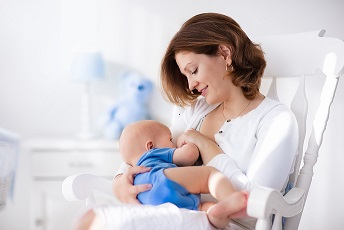Breastfeeding is safe and the benefits of breastfeeding your baby will long outlast the COVID-19 pandemic.
To view our complete series of COVID-19 blogs, click here.

Even if you have suspected or confirmed COVID-19, breastfeeding is still recommended. The Royal College of Obstetricians and Gynaecologists have reassured mums that the benefits outweigh any risk of your baby catching the virus from your breastmilk and in fact there is currently no evidence1 that the virus is passed on in breastmilk.
This is an anxious time for everyone, not least parents of infants. It is worth knowing that breastfeeding can relax you and your baby by releasing helpful hormones (oxytocin and prolactin).
A further help during COVID-19 is that breastmilk is free and avoids a trip to the shops!
Lots of other benefits for mums and babies are outlined at www.breastfedbabies.org.
Breastfeeding during COVID-19
You may find that lockdown means less visitors than you would have had, and more time to just ‘be’ with your baby. Make the most of this time, with skin–to-skin contact – it helps keep a good milk supply, as does breastfeeding frequently and responsively (including through the night).
Keep an eye on your baby’s wet and dirty nappies to know that things are going well. For more information on what to expect, see ‘Off to a Good Start’ (link below).
If you have suspected or confirmed Covid-19, the following precautions1 are recommended:
- Wash your hands before touching your baby, breast pump or bottles
- Try to avoid coughing or sneezing on your baby
- Consider wearing a face mask while breastfeeding, if available
- Follow recommendations for pump cleaning after each use
- Ask your partner or consider asking someone who is well to feed your expressed breast milk to your baby.
This may sound like a lot of effort, but bottle-feeding would also mean similar precautions to prevent spreading the virus.
Support during COVID-19
Even though home visits from health professionals are reduced or will have stopped, you aren’t on your own.
Your Trust will have provided you with telephone numbers for community midwives and health visitors. You may also have a breastfeeding peer support volunteer who is available over the phone or via text.
If you don’t already have a copy of the purple book ‘Off to a Good Start’, you can read it here www.publichealth.hscni.net/publications/good-start .
You can get ‘attachment and positioning’ information at www.breastfedbabies.org which offers helpful videos and pictures.
The National Breastfeeding Helpline is available 7 days a week from 9:30am to 9:30pm - 0300 100 0212. They also offer a web chat www.breastfeedingnetwork.org.uk/chat/ breastfeeding support service for mums and their supporters in the UK. It is a confidential one-to-one secure online chat with a trained breastfeeding supporter. It works like instant messaging – it’s just typing, there are no webcams, and the only people who can see the chat are the user and the volunteer supporter.
If you’ve recently stopped breastfeeding
It is possible to return to breastfeeding if you have recently (within the past few months) stopped and breastfeeding was well established. Speak to your health professional if this is something that you would like to re-establish.
And a final note
The longer you breastfeed the better. Remember the benefits for you and your baby will long outlast the COVID-19 pandemic.
The World Health Organisation recommends that babies are exclusively breastfed until around 6 months, and then after solid foods are introduced, that breastfeeding continues into the 2nd year of life and beyond.
So keep your baby close, enjoy this time together and reach out for help if you need it.
Health guidance may change as knowledge on coronavirus evolves. To stay up to date with guidance on breastfeeding, see https://www.rcog.org.uk/en/guidelines-research-services/guidelines/coronavirus-pregnancy/covid-19-virus-infection-and-pregnancy/#recently
Information on breastfeeding support during COVID-19 is also available from UNICEF UK Baby Friendly Initiative https://www.unicef.org.uk/babyfriendly/covid-19/
If your baby becomes unwell, seek medical advice from your GP. For more information, visit https://www.publichealth.hscni.net/news/seek-urgent-help-if-your-child-becomes-unwell
Reference
- RCOG - Royal College of Obstetricians and Gynaecologists accessed 22/4/20 at https://www.rcog.org.uk/en/guidelines-research-services/guidelines/coronavirus-pregnancy/covid-19-virus-infection-and-pregnancy/
To view our complete series of COVID-19 blogs, click here.
